When asked about the state of U.S.-China relations, Americans offer mostly negative assessments: A substantial share consider China an enemy of the U.S., and most think limiting China’s power and influence should be a top foreign policy priority for the U.S. About two-thirds of Americans think China is having a great deal or fair amount of negative influence on the U.S. economy.
Americans increasingly see China as an enemy
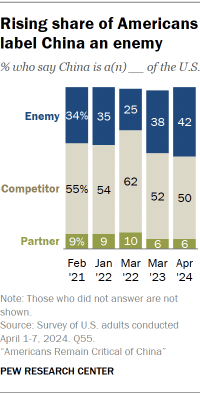
Around four-in-ten Americans (42%) say China is an enemy of the U.S. This is fewer than the 50% who describe China as a competitor but a slight increase from the 38% of Americans who described China as an enemy last year. It is also the largest share who have described China as an enemy since we began asking the question.
Age
Older Americans are more likely than younger ones to describe China as an enemy. A majority of those ages 50 and older (55%) describe China as an enemy, including 61% of those ages 65 and older. Among adults under 50, three-in-ten say the same – including around a quarter (27%) of adults under 30.
Party and ideology
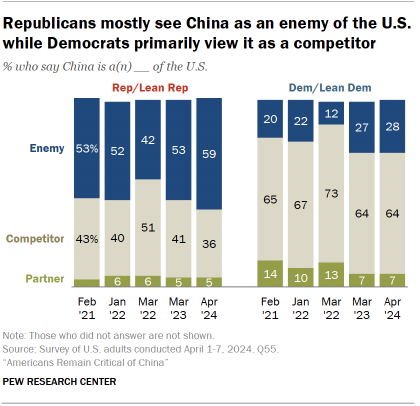
As has been the case in recent years, Republicans and Republican-leaning independents are significantly more likely than Democrats and Democratic leaners to describe China as an enemy (59% vs. 28%). Among Republicans, this share has increased 6 percentage points since 2023, from 53%. Among Democrats, views did not change significantly over the past year.
Conservative Republicans (69%) are particularly likely to describe China as an enemy, relative to moderate and liberal Republicans (38%), conservative and moderate Democrats (30%), and liberal Democrats (25%). Aside from conservative Republicans, roughly half or more in each group describe China as a competitor.
Economic attitudes
Assessments of whether China is an enemy, competitor or partner of the U.S. are related to views about the U.S. economy. For example, Americans who think the U.S. economy is currently in poor shape are significantly more likely than those who think it is in good shape to call China an enemy (48% vs. 29%).
Additionally, people who think China has a great deal or a fair amount of influence on economic conditions in the U.S. are much more likely than those who think it has less influence to call China an enemy (45% vs. 25%).
Limiting China’s power and influence
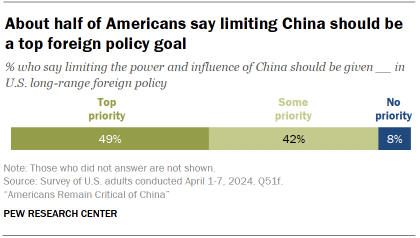
When asked to prioritize 22 possible long-term foreign policy goals, limiting the power and influence of China is given top priority by 49% of Americans. Another 42% say this should be given some priority, and 8% say limiting China’s power should not be a priority at all in U.S. foreign policy.
As with the sense that China’s influence has recently grown stronger, the desire to limit China is more prominent among older Americans and Republicans:
- About seven-in-ten Americans ages 65 and older (72%) say limiting China’s power and influence should be a top priority. That share decreases significantly as the age group surveyed gets younger, with just 28% of those ages 18 to 29 giving this top priority.
- A majority of Republicans (59%) say curbing China’s influence should be a top priority, compared with 42% of Democrats.
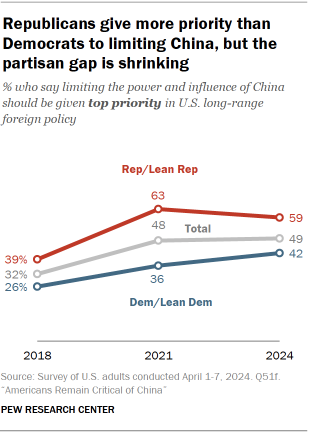
Since 2018, the share who prioritize limiting the power and influence of China has grown more than the share prioritizing any other foreign policy goal we asked about. Most of this increase occurred between 2018 and 2021, when American views of China grew precipitously less favorable.
Since 2021, Americans’ prioritization of this foreign policy goal has changed little, but the partisan divide on the issue has shifted. Today, Democrats give more priority to limiting China than they did in 2021 (+6 points), while concern among Republicans has stayed about the same over that period. This brings what was once a 27-point gap between Republicans and Democrats down to 17 points.
China’s economic influence on the U.S.
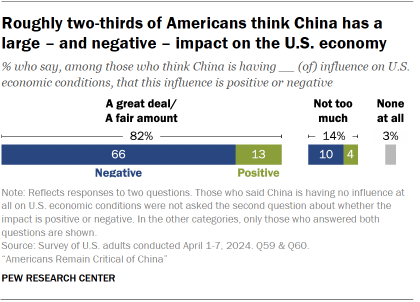
A large majority of Americans (82%) think China has at least a fair amount of influence on economic conditions in the U.S., including 28% who say it has a great deal of influence. Another 14% say it doesn’t have much influence, and only 3% say it has no influence at all.
Among those who think China has at least some influence on economic conditions in the U.S., a large majority (79%) think that that influence is negative, while 18% say it’s positive.
Taken together, roughly two-thirds of Americans think China has a great deal or a fair amount of negative influence on U.S. economic conditions. Far fewer think it has a great deal or fair amount of positive influence on economic conditions (13%). And small shares see it having limited positive impact (4%) or limited negative impact (10%).
Age
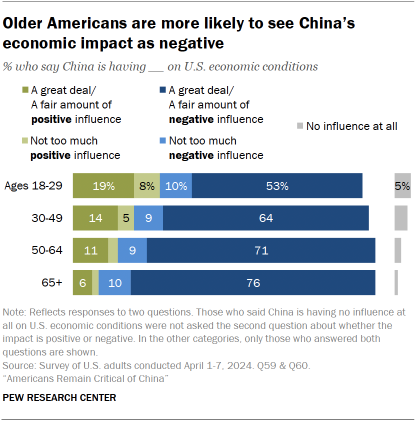
Older Americans are far more likely than younger ones to say that China has a large amount of negative influence on the U.S. economy. Around three-quarters (76%) of those ages 65 and older take this position, compared with only 53% of adults under 30. And, while still a minority position, adults under 30 are significantly more likely to say China has a large positive influence on the U.S. economy, with 19% saying this.
Party and ideology
Republicans are more likely than Democrats to say China has a large negative influence on the U.S. economy (78% vs. 58%). This is particularly true for conservative Republicans (83%), relative to moderate and liberal Republicans (69%). Among Democrats, conservatives and moderates (57%) and liberals (61%) largely agree on this issue.
Economic attitudes
Americans who think the U.S. economic conditions are poor are more likely than those who think conditions are good to say China has a large negative influence on America’s economy (72% vs 55%).
Personal economic circumstances are also tied to how people see China’s influence on the U.S. economy. Americans with upper incomes (71%) and middle incomes (73%) are more likely than those with lower incomes (55%) to say China has a large negative impact on the American economy.




